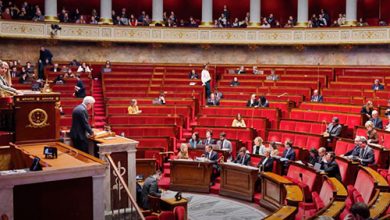MEDIA APP WARS

In a move that has sparked fierce debate, and raised significant questions about both privacy and national security, the US government has taken the bold step of banning the hugely popular social media app TikTok, which is owned by Chinese tech giant ByteDance.
THE TIKTOK CLOCK IS TICKING!
Fazmina Imamudeen reports on the uproar about the Chinese app in the US
TikTok’s global impact is undeniable. Its short form videos and captivating challenges have made the app a cultural phenomenon that has drawn millions of users worldwide.
Yet, its widespread popularity also sparked apprehension – particularly in the United States where policy makers expressed caution regarding its Chinese ownership and potential national security implications.
The decision to ban its use in the US has far-reaching implications for the tech industry and triggered a broader conversation about the role of government in regulating digital platforms.
A recent development in this saga was the decision regarding TikTok on the basis of national security concerns. Plans to prohibit the app have been in the works for several years. But it has now garnered bipartisan support, and is expected to have extensive implications for both the tech industry and millions of TikTok users stateside.
At the heart of the issue is the fear that TikTok could be used as a tool for espionage or data collection by the Chinese government. While TikTok has repeatedly denied these allegations and insisted that it stores user data securely, lawmakers remain unconvinced and point to China’s track record on cyber espionage and data theft.
Banning TikTok poses multifaceted challenges that extend beyond legal battles. The platform’s vibrant community, which comprises predominantly young users, could become a political force to reckon with if it is alienated.
Many businesses – especially small and medium-size enterprises – have built their marketing strategies around TikTok, and rely on its reach and engagement to thrive. Even larger corporations have embraced the app as a vital tool for brand promotions and customer engagement.
Moreover, proving its unique threat to national security amid a sea of data collecting social media platforms is a daunting task. While privacy concerns are valid, demonstrating that TikTok presents a more significant risk than other platforms requires meticulous evidence gathering and analysis.
The ban, which was signed into law by President Joe Biden recently, gave ByteDance nine months to sell its operations in the US or face a complete ban stateside. That deadline falls on 24 January 2025 with a possible 90-day extension.
For TikTok users, the prohibition raises a host of questions about the future of the platform and its digital presence.
While the ban doesn’t mean TikTok will disappear overnight, the platform will no longer be available for downloading from app stores. This could eventually lead to TikTok becoming obsolete as it becomes increasingly difficult to use without updates and security patches.
This decision also has broader implications for the tech industry as a whole.
It represents a major escalation in ongoing tensions between the US and China, over technology and national security. And it raises questions about the role of government in regulating the tech industry, and the balance between security and tech innovation.
TikTok has vowed to fight back in the courts of law as well as the court of public opinion. The business has launched a campaign to rally support from its users and vowed to challenge the decision legally.
Presently, TikTok remains in limbo as it is caught between the need for national security and the desires of millions of users. It will be interesting to see whether ByteDance will be able to fight its way out of the ban in the months ahead.





